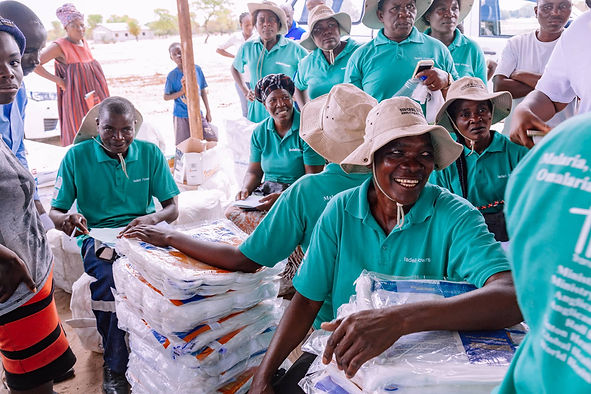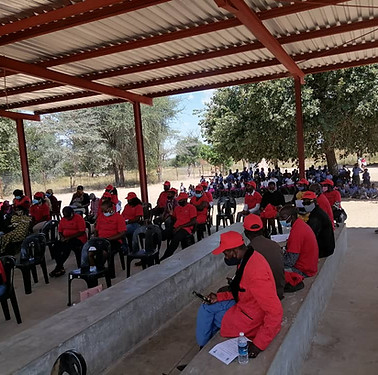
NAMIBIA

Overview
The Namibia Anglican Community Development Organization (NACDO) of the Anglican Diocese of Namibia implements Isdell:Flowers Cross Border Malaria Initiative work as part of the cross border Trans Kunene Malaria Initiative (TKMI).
NACDO’s work focuses on community mobilization and is guided by the National Vector-borne Diseases Control Programme’s (NVDCP) National Malaria Strategic Plan. Low levels of malaria transmission can lead to a low perceived risk
of malaria, which makes it especially important to sustain the motivation to reduce malaria levels to zero.
The Isdell:Flowers Cross Border Malaria Initiative remains
a steadfast presence in communities within six constituencies in Ohangwena Region, which borders Angola.
The Isdell:Flowers program areas in Namibia and the neighboring municipalities are outlined below. To download the map as a PDF, click here.
Page Navigation
Jump to



MALARIA WORK IN ACTION

Household and community level malaria education delivered by community malaria volunteers
Community malaria volunteers (CMVs) and community health workers (CHWs) provide malaria education to households during door-to-door visits. Volunteers also conduct malaria education sessions at common gathering places within their villages, such as local shops. in 2022, volunteers made more than 30,000 household education visits.

Equipping community leaders with the knowledge and support to facilitate malaria elimination efforts within their communities
The NACDO team has worked closely with more than 200 traditional leaders over the past two years. These leaders teach about malaria during village meetings and encourage their communities to accept indoor residual spraying. Local traditional leaders are widely respected among their communities and are well positioned to effectively advocate for malaria elimination.

Close collaboration with regional health clinics
NACDO malaria field officers collaborate with more than 12 regional health clinics to improve follow-up of patients diagnosed with malaria, to ensure full completion of their anti-malarial course and to provide malaria education.

Community-based testing and treatment
A team of community health workers and a registered nurse provide malaria education, malaria testing and treatment, and conduct reactive malaria surveillance following reports of positive malaria cases from health facilities. In 2022, the team conducted follow-up for 37 people who tested positive for malaria by providing them with insecticide treated nets, conducting reactive indoor residual spraying in the households of the index cases, and testing those who live in close proximity to the index cases.

Recruiting and training new malaria volunteers and community health workers
The NACDO team ensures that malaria volunteers have up to date malaria knowledge, as policies and malaria realities change over time. In 2022, 30 new malaria volunteers and 6 new community health workers were recruited and trained in order to extend the reach of the program.
DATA FOR DECISION MAKING
Collecting and using local data for programmatic decision making
In partnership with the J.C. Flowers Foundation, NACDO carries out an annual survey to measure changes in levels of malaria knowledge, attitudes, and key malaria prevention practices among households located in villages that are a part of the Isdell:Flowers program. This data is used by NACDO and those affected by malaria to guide program planning and prioritization. Click the button below to view Namibia's 2023 KAP survey results.

VOLUNTEER SPOTLIGHT
Ms. Shikufa's Story
Julia Shikufa is a teacher at Omawila Primary School in Ekokofi, a rural village in Okongo Constituency, Namibia. Prior to NACDO expanding the malaria program into communities within Okongo, Julia said that many people in her community did not know about malaria and believed that the symptoms of those infected were actually caused by eating young fruits, witchcraft, or demons. In 2021, Julia and several other teachers from surrounding schools received training from the NACDO team on malaria transmission, prevention, signs and symptoms, and proper care-seeking behavior for suspected malaria cases.
Since then, she has taken it upon herself to find creative ways to teach about malaria in her lesson plans and educate students’ parents about proper care-seeking behavior during parent-teacher meetings. She also helps facilitate malaria teachings during morning devotionals. At Omawila school, about 15-20 of the students sleep at the school since their households are very far away. “I’m a teacher, but I also play the role of a parent since some students board at the school due to long distances from their households,” Julia said. “Many of these kids have tested positive for malaria and I have been taking care of them by administering their prescribed anti-malarial medicine and any other necessary care.” Julia is motivated to continue advocating for malaria elimination in Okongo so that children can attend school healthy and ready to learn.
FLAME NAMIBIA
Faith Leader Advocacy for Malaria Elimination (FLAME)
The Faith Leader Advocacy for Malaria Elimination (FLAME) Initiative in Namibia is implemented through NACDO, and is a coalition of leaders from diverse faiths driven to improve and sustain the health and well-being of Namibians affected by malaria. Established in 2021, the project catalyzes the formation of technically competent interfaith coalitions of religious leaders to advocate for the:
-
adoption of policies and strategies that accelerate malaria elimination
-
implementation of policies and strategies that accelerate malaria elimination
-
necessary funding for these policies
In Namibia, the FLAME Coalition is comprised of a central-level coalition and five sub-national coalitions from the Regions with the highest malaria transmission including Zambezi, Kavango East, Kavango West, Oshikoto and Ohangwena Regions. The work of FLAME aligns with the Namibia Malaria Strategic Plan (NMSP) and faith leaders work closely with the multisectoral Malaria Elimination Task Forces (METF) within regional government structures.
To join the FLAME Namibia Coalition or learn more, contact the National Coordinator at flamecoordinator@nacdo.org.na or follow the FLAME Namibia Facebook page.

.jpeg)
NAMIBIA
MALARIA WORK IN NUMBERS
10,000
households received malaria education from malaria volunteers
Year:
2022
86%
The proportion of people living within program area households that reported sleeping under a bed net the previous night -- a 6% increase from 2021
89
Mothers and caregivers received training on the importance of seeking care promptly when their children have malaria symptoms
3,000
The number of school learners who were educated on malaria transmission and prevention
267
community malaria volunteers actively encouraging malaria prevention in their own villages
NAMIBIA TEAM
Windhoek Management and Administrative Team

Reverend Patrick Djuulume
Bishop, Anglican Diocese of Namibia
.jpeg)
Stefanus Nangombe
Director

Ndakundana Hamukwaya
Program Manager
%2C%20TKMI.jpg)
Bertha Iindongo
Finance Manager

Victoria Amunyela
Accountant

Leo Nafuka
Finance Officer

Kuwilileni Namolo
Registered Nurse

Jason Tomas
Case Management Supervisor
TKMI - Community Testing Team

Helvi Kashuku
Project Officer
%2C%20TKMI_j.jpg)
Isak Uukongo
Data Clerk
.jpeg)
Amalia Hangula
Administrative Officer
TKMI - SBCC Team
FLAME Namibia Team

Griffith Siloka
National Advocacy Coordinator
.jpeg)
Lesley-Anne Wyk
Regional Advocacy Coordinator

Noleen Mouton
Office Administrator
Communities affected by malaria are at the heart of this work. Malaria elimination is possible because of committed volunteers and activists, teachers, faith and traditional leaders, and mobilized communities.


